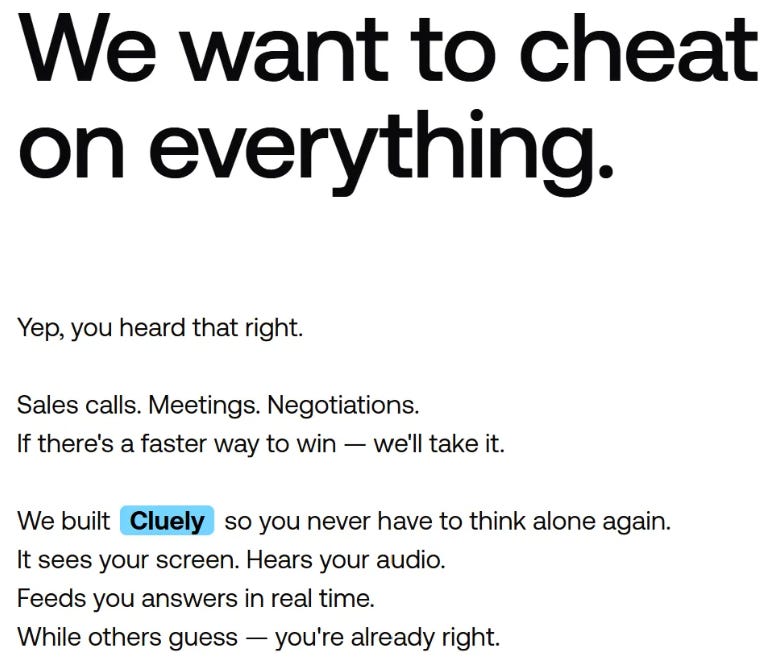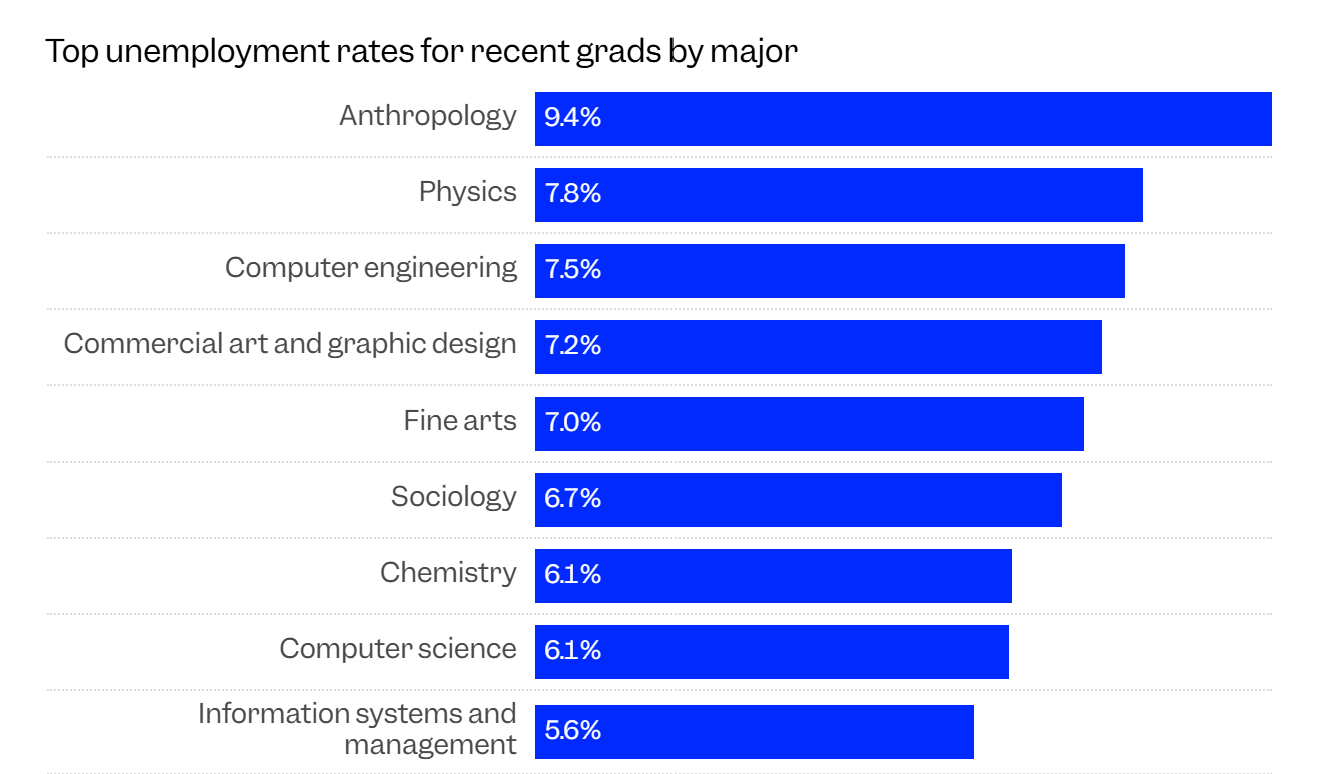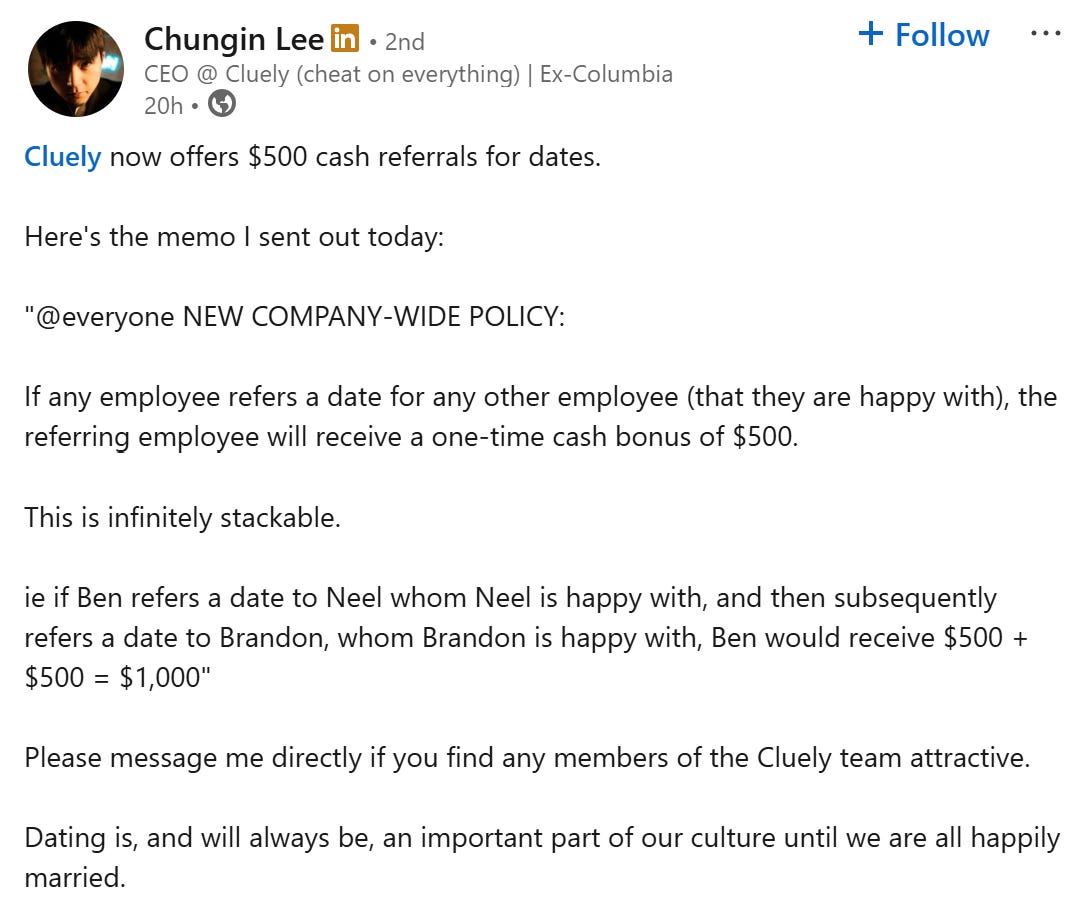How the rise of Cluely (a tool for cheating) exploited the science of online virality
Issue 175: A 21-year-old CEO, an AI tool for cheating, and a $1.5 million dollar rave to game the attention economy
Chungin “Roy” Lee keeps showing up on my LinkedIn and TikTok feed, and you may know him too — for his infamous ousting from Columbia University which went viral on social media earlier this year. On his professional profile, he said he was kicked out of Columbia for “being too handsome + having too many huzz”.

While working on their undergraduate degrees, Roy and Neel Shanmugam invented Interview Coder: an AI-powered, undetectable app that helps interviewees pass coding interviews for computer science-related jobs. Their plan was to “use it themselves, get offers from top companies, film everything, and ride the shock factor”.
Roy focused more on distribution and virality than the product, so he and Neel built it in 10 days using open-source AI and launched it on LinkedIn. He then filmed and posted his entire Amazon recruitment process where he used InterviewCoder from online assessment to final offer to show how it works. After an Amazon employee saw the video, they reported it to Columbia which resulted in Roy’s dismissal from the university. Now, they are building Cluely, a tool that aims to help people cheat on everything. Eventually, they allegedly want to embed Cluely via micro-chip form into human brains.
As a Silicon Valley resident, it’s hard not to hear about the actions and ambitions of local start-ups. I actually have some mutuals with the exec team at Cluely and their “frat house” office is nearby. But still, their reach beyond tech without a polished product is impressive. Earlier this year, they recieved a $15 million seed from A16z just months after their initial fundraising round of $5.3 million. The translation from online clout to cash is real.
Most people have an intuition about why a 21-year-old CEO and his start-up’s unique culture is so notorious. But here’s what social psychological factors play into it:
How Roy Lee became a “king of distribution and virality”
Activating morality: Research has found that content with moral underpinnings is more likely to go viral on social media. Specifically, posts that use moral-emotional language to talk about social transgressions tends to spread quickly on social media. Words that can activate both morality and emotion are “abuse”, “honor”, “spite” and “greed”. Thus, Cluely’s tagline, “Cheat on everything” is highly effective in capturing attention, controversy, and clicks.

Negative content: Roy’s understanding of Twitter/X users is that “They love controversy, drama, and attention; they love to either dog on people or watch people get dogged on.” In an interview, he explained that if half the people in the world wouldn’t feel very negatively about a post, it probably won’t go viral — most viral content requires a controversial twist. He is correct. Content that is divisive, negative, and controversial tends to get more engagement compared to positive or educational content.
Notably, Cluely’s ads have depicted scenes of violence and verbal aggression to game the attention economy. High-arousal, negative content tends to attract attention. Arousal refers to the intensity of an emotion, regardless of its valence (negativity or positivity). Anger and excitement are high-arousal emotions, sadness and calm are low-arousal emotions.
Being keen to high-arousal, negative information likely has evolutionary origins. It can be valuable for people to pay attention to these types of information because it can signal threats to wellbeing. However, social media environments are an example of evolutionary mismatch, because many people pay too much attention to negative information online that doesn’t help in real life.
Acknowledge a shared sense of reality: Hiring in tech has slowed down in recent months/years. Computer science and engineering majors are now among the top 10 majors with the highest unemployment rate. Interview Coder’s popularity likely stemmed from a shared frustration among job seekers who struggle in coding interviews. While the questions are meant to evaluate problem solving and critical thinking, success often relies on familiarity with the problem and the ability to memorize (sort of like studying for the SAT). These interviews are an obstacle for fresh grads, and Roy’s marketing created a sense of shared reality in a tough job market.

Chart from Business Insider. Unemployment rates are for 22- to 27-year-old college grads as of 2023 Source: Federal Reserve Bank of New York Content that rallies people around a solution to a collective problem is more likely to be shared because people see it as potentially beneficial to their communities.
Being unhinged: Unhinged marketing has worked for Cluely because it increases brand awareness, which ultimately increases conversions in the long-run. In an interview, Roy explained, “If I say extremely crazy shit online, it will make more people interested in me and the company and drive more downloads and conversions for Cluely. If anything, I need to become crazier online so that people will keep funneling attention towards the core product.” In another article, he shared his plans to throw a $1.5 million dollar rave in September which would promote Cluely.
Overall, the strategies that Roy and his marketing team have employed are prime examples of types of content that use human cognition to go viral on social media. Social media algorithms are designed to promote this content because they too, understand social psychology. All this to say, be mindful of your social media consumption and take notice when trolls like Roy Lee are ragebaiting for clicks.
News and Updates
Today is the last day to enter our book giveaway! Check out our interview with Matthew Facciani about his new book, Misguided to leave a comment and enter the giveaway. Paid subscribers are automatically entered. Good Luck!
*Closes Aug 5th, 11:59PM PST
Catch up on the last one…
More on the funhouse of social media in last week’s newsletter. Ideas on social media do not reflect people’s beliefs in real life.






It’s really amazing how much this feels like a Wild West/New frontier.
Fascinating. It’s amazing (if not entirely surprising) that people are willing to invest money in a startup run by a group of “out” sociopaths. Why expect them to use the money in the way they say they will? Just watch. Embezzlement. Fraud. Fake sales reports. It’s not a matter of whether but when and how big.